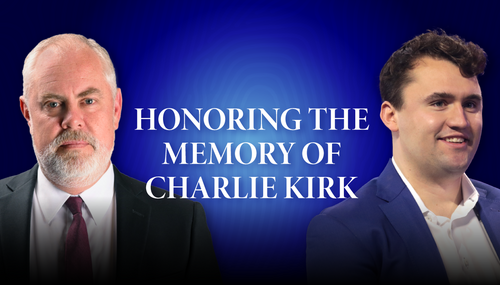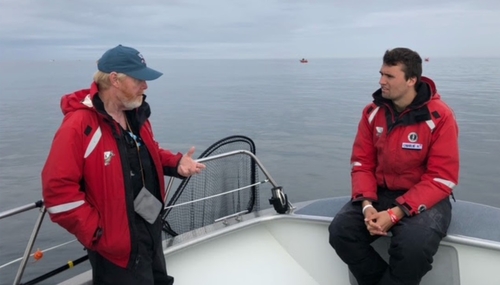
The question is, really, is what General McChrystal and his aides are doing so egregious, that they deserved to end a career like McChrystal's? Michael Hastings has never served his country the way McChrystal has.
As for Hastings’ insistence he didn’t break any “off the record” ground rules, Logan declared: “Something doesn't add up here. I just -- I don't believe it.”
The subterfuge really infuriated Logan: “What I find is the most telling thing about what Michael Hastings said in your interview is that he talked about his manner as pretending to build an illusion of trust and, you know, he's laid out there what his game is. That is exactly the kind of damaging type of attitude that makes it difficult for reporters who are genuine about what they do....Clearly, you've got someone who is making friends with you, pretending to be sympathetic, pretending to be something that they're not...”
Taking on Rolling Stone, Logan charged the “magazine put their own spin on this. They said that the greatest enemy for McChrystal is the wimps in Washington. Nowhere in the article does McChrystal refer to ‘the wimps in Washington.’ That's Rolling Stone magazine, how they chose to cast this, to make it as sensational as possible. And that was with intent.”
(Logan echoed Newsweek’s Evan Thomas, who asserted on this weekend’s Inside Washington: “When they go to bars they...blow a lot of steam off. I don't think the reporter should have printed that stuff.”)
In the pevious segment, Hastings insisted to Kurtz that he doesn’t have a political agenda: “If Bill O'Reilly is calling you a far-left critic, in my book, no matter what your political persuasion is, that probably means you're doing a good job.”
(A couple of tweets I sent a few days ago about the political persuasions of McChrystal and Petraeus, starting with banning the wrong outlet:> Marc Ambinder on McChrystal: A liberal, voted for Obama, “he banned Fox News from the TV sets in his headquarters.” http://bit.ly/cx1t8i
> Petraeus has home in NH where “his personal vehicle sports 'Live Free or Die' license plates.” Union Leader story: http://shar.es/mIeUw )
From the Sunday, June 27 Reliable Sources on CNN:
HOWARD KURTZ: If you had been traveling with General McChrystal and heard these comments about Barack Obama, Joe Biden, Jim Jones, Richard Holbrooke, would you have reported them?
LARA LOGAN, CBS CHIEF FOREIGN CORRESPONDENT: Well, it really depends on the circumstances. It's hard to know -- Michael Hastings, if you believe him, says that there were no ground rules laid out. And, I mean, that just doesn't really make a lot of sense to me, because if you look at the people around General McChrystal, if you look at his history, he was the Joint Special Operations commander. He has a history of not interacting with the media at all.
And his chief of intelligence, Mike Flynn, is the same. I mean, I know these people. They never let their guard down like that. To me, something doesn't add up here. I just -- I don't believe it.
KURTZ: When you are out with the troops and you're living together and sleeping together, is there an unspoken agreement-
LOGAN: Absolutely.
KURTZ: -that you're not going to embarrass them by reporting insults and banter?
LOGAN: Yes.
KURTZ: Tell me about that.
LOGAN: Yes, absolutely. There is an element of trust. And what I find is the most telling thing about what Michael Hastings said in your interview is that he talked about his manner as pretending to build an illusion of trust and, you know, he's laid out there what his game is. That is exactly the kind of damaging type of attitude that makes it difficult for reporters who are genuine about what they do, who don't -- I don't go around in my personal life pretending to be one thing and then being something else. I mean, I find it egregious that anyone would do that in their professional life.
And, I mean, I take that to the point of, even when I apply to interview someone about something difficult, and they want to know the areas of the interview, I might not say, well, we're going to spend the whole interview on this, but I will list that. I will list that controversial issue.
KURTZ: Because you don't want to blindside them.
LOGAN: Because I don't believe in that.
KURTZ: But don't beat reporters -- aren't they nice to people to gain their confidence, and sometimes they have to write things that are not flattering?
LOGAN: Of course. I mean, the military is a good example. I have never been -- they never know what to do with me because I've never been accused of being right wing. And they want to paint me as left wing because they expect the media to be that way. But, if you look at my body of work, it's been always been accurate and fair.
Now, Michael Hastings might look at my body of work and say, well, there's an example of another one of those reporters, unlike me, that didn't go and tell the truth because they wanted to come back. That's not the case at all.
KURTZ: He says that all of the things that have been written about Stanley McChrystal have been these glowing profiles. He's suggesting that he did a job that the regular beat journalists have not done.
LOGAN: I think that's insulting and arrogant, myself. I really do, because there are very good beat reporters who have been covering these wars for years, year after year. Michael Hastings appeared in Baghdad fairly late on the scene, and he was there for a significant period of time. He has his credentials, but he's not the only one.
There are a lot of very good reporters out there. And to be fair to the military, if they believe that a piece is balanced, they will let you back. They may not have loved it. They didn't love the piece I did about hand grenades being thrown in Iraq that were killing troops. They didn't love that piece, it made a lot of people very angry. They didn't block me from coming back.KURTZ: The Washington Post quoted an unnamed senior military official as saying that Michael Hastings broke the off-the-record ground rules. But the person who said this was on background and wouldn't allow his name to be used. Is that fair?
LOGAN: Well, it's Kryptonite right now. I mean, do you blame them? The commanding general in Afghanistan just lost his job. Who else is going to lose his job? Believe me, all the senior leadership in Afghanistan are waiting for the ax to fall. I've been speaking to some of them. They don't know who’s going to stay and who’s going to go.
I mean, the question is, really, is what General McChrystal and his aides are doing so egregious, that they deserved to end a career like McChrystal's? Michael Hastings has never served his country the way McChrystal has.
KURTZ: Is this going to prompt the military, in general, the commanders in Afghanistan in particular, to be more wary of journalists?
LOGAN: Of course, because what you see is not what you get. Clearly, you've got someone who is making friends with you, pretending to be sympathetic, pretending to be something that they're not, and then they're taking what you say -- when you start an article with General McChrystal making obscene gestures, you're not even using something that he said.
And Rolling Stone magazine put their own spin on this. They said that the greatest enemy for McChrystal is the wimps in Washington. Nowhere in the article does McChrystal refer to "the wimps in Washington." That's Rolling Stone magazine, how they chose to cast this, to make it as sensational as possible. And that was with intent.




